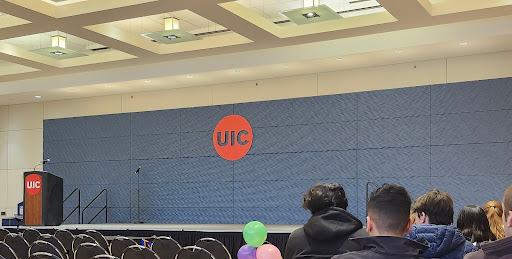Changes bring choice and creativity to English classes
In an effort to combat a lack of interest in assigned reading, Glenbard East has been implementing new methods in English classes, ones that facilitate a more creative and choice-driven curriculum.
English department chair, Sara Schumacher, said that students are often put off reading by the time they reach high school, and come with a lack of confidence in their reading skills. Assigned novels can be complex and challenging, and students are struggling.
“People don’t like to do things they aren’t good at,” says Schumacher, explaining students’ lack of interest in reading.
Schumacher said that in addition to ensuring students gain critical reading skills, the English courses also provide materials in which “kids will see themselves in what they’re reading.” She explains the concept of the “mirror” and the “window.” Students being able to relate to the material and see themselves in what they are reading is the “mirror,” but on the flip side, students being exposed to vastly different situations and scenarios, ones they can not relate to, is the idea of the “window.”
Assigned literature should be “giving them a lens to a new world, creating empathy. It is our job as a department to show both [mirror and window],” she said.
In recent efforts to help students gain confidence in reading, make them excited about class, and to fulfill the goals of english class, some English courses have begun to integrate a more creative and choice-driven course into the curriculum. English classes are now introducing choice novels and book clubs, activities that allow students to select a book from a group of material provided by the teacher. Commonly, these reading options revolve around a central question or theme, one that can be applied to the class.
By providing a variety of books, students are able to find material that expose them to the “mirror” and “window” concepts, Schumacher said.
Classes have also captured students’ attention by having them complete creative projects to accompany standard multiple choice tests. Schumacher said teachers are keeping the challenging reads, but are using creative and engaging projects that require deep level analysis and are still interesting.
For instance, Katherine Posacki’s AP Literature class just completed Thomas Hardy’s Tess of the d’Urbervilles.
Sh said, “In recent years, the English Department has worked hard to redesign courses so there is more choice, variety of assessments, and creative work. I feel that the honors and AP track should be no different.”
As a result, Posacki’s students created a podcast that included plot summary, character analysis, and comical advertisements which created an entertaining project that still required high level thoughts. Posacki says that “In the past, students have individually written book reductions as a review tool both for the unit and AP exam. The podcast assignment assesses the same skills in a more creative and collaborative format.”
Schumacher says that the changes in English classes lie in what students are doing with the knowledge they gain from the assigned reading. It does not benefit the student to be solely tested on their ability to analyze what they were taught; they need to be able to apply their knowledge through the filter of their own thinking.
She said that “difficult learning with fun projects is possible, you just have to think about it a bit differently.”

Abby is a senior and she has been involved with the echo for one year as an Arts and Entertainment Editor. Abby also participates in theater and ballet,...







